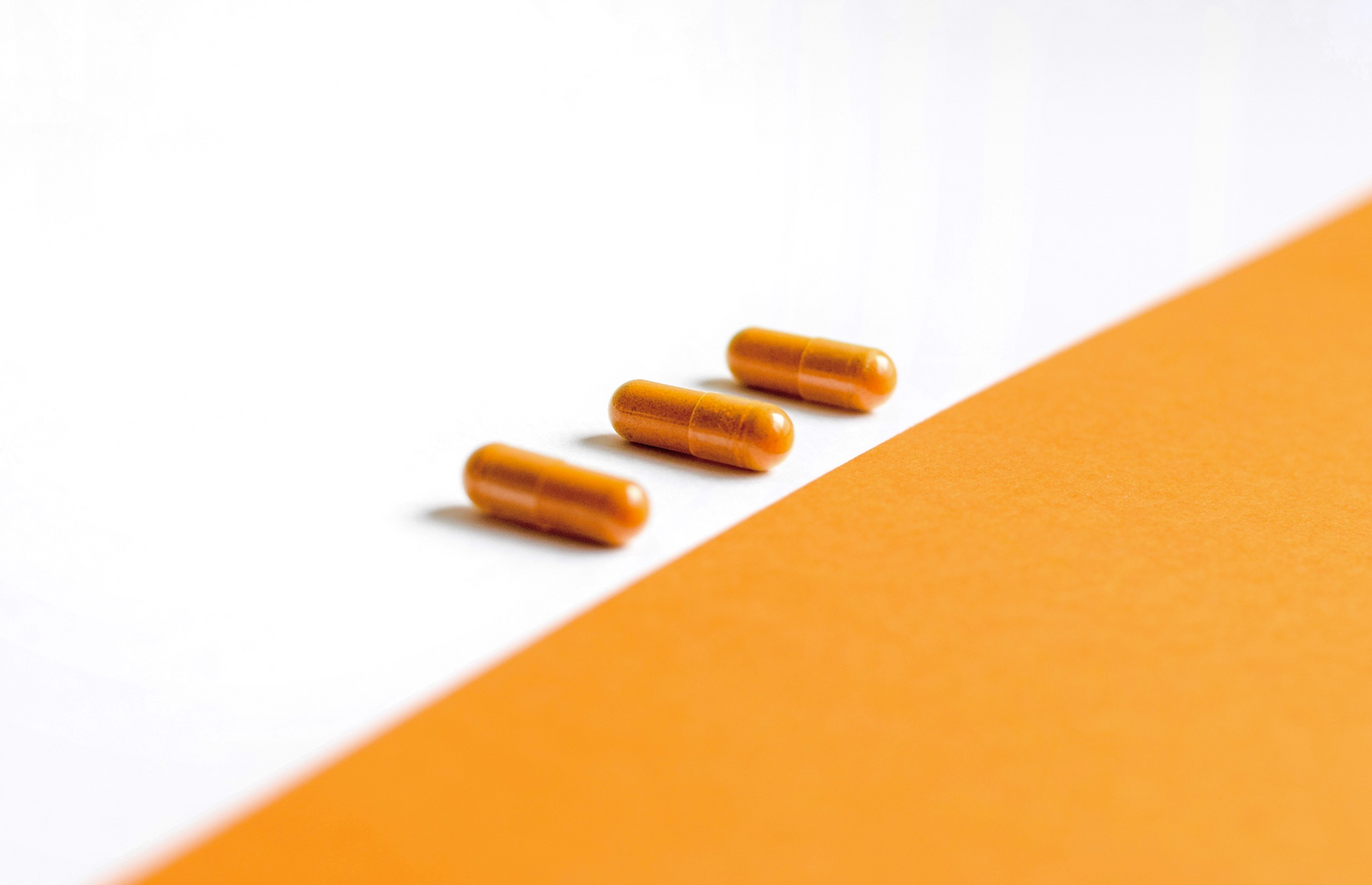In this guide to turmeric, you will learn
- What Is Turmeric?
- How Does Turmeric Work?
- What Are The Benefits Of Turmeric?
- Turmeric Dosage
- Turmeric Side Effects
- Are Curcumin And Turmeric The Same Thing?
- The Best Turmeric Supplement
- When Should You Take Turmeric?
What Is Turmeric?
Turmeric is a rhizomatous herbaceous perennial plant also known as Curcuma Longa, which is derived from the ginger family. Turmeric grows primarily in India, and also in parts of Southeast Asia. Turmeric is commonly used as a spice primarily in curries. For years, Turmeric has been used amongst ancient Indian tradition for its purported healing purposes, by reducing inflammation and pain.
How Does Turmeric Work?
Turmeric contains over one hundred unique chemical properties that contribute to its countless therapeutic and anti-inflammatory effects. Research suggests that Turmeric’s active ingredient Curcumin, which gives turmeric it’s beautiful yellow-orangish color is responsible for the myriad of health benefits associated with Turmeric. Curcumin is a polyphenol (micronutrients that are packed with antioxidants) and targets multiple signaling molecules at the cellular level. Curcumin has proven to have powerful antioxidant and anti-inflammatory benefits, which can help in the management of exercise-induced inflammation and muscle soreness, thus enhancing recovery, and optimizing performance.
What Are The Benefits Of Turmeric?
Reduces Inflammation & Pain
One of the core benefits of Turmeric, primarily curcumin is found in its ability to act as an anti-inflammatory agent and reducing pain. Research has shown that curcumin is a highly active molecule that modulates the inflammatory response by inhibiting the production of inflammatory cytokines. This is especially beneficial to those athletes that participate in high impact or high-intensity functional training.
Evidence suggests that Turmeric also provides similar analgesic (pain reducing) and anti-inflammatory effects as ibuprofen. Considering that Turmeric is a naturally sourced herbal remedy and ibuprofen is an over the counter NSAID (Nonsteroidal anti-inflammatory drug), turmeric is a safer and natural alternative to Ibuprofen for inflammation and post-workout joint pain.
RELATED ARTICLE How To Reduce Joint Pain In 6 Simple Steps
Improves Joint Health & Mobility
In a randomized controlled study on knee osteoarthritis published in the Journal Of Evidence-Based Complementary and Alternative Medicine 367 collective patients with a pain score of five or higher were administered 1,500mg of turmeric or 1,200mg of Ibuprofen per day for four weeks.
Outcomes measured were joint pain, joint stiffness, and mobility scores. The results indicated that curcumin extracts were non-inferior to ibuprofen. Both groups showed significant improvement in pain, inflammation, and mobility scores when compared to baseline.

The results indicated that 1,500 mg of turmeric supplement consumption daily was shown to have anti-inflammatory and analgesic properties comparable to 1,200 mg of ibuprofen with patients with knee osteoarthritis [R, R]
Additionally, the curcumin group exhibited lower adverse effects on gastrointestinal health than the ibuprofen group [R, R].
Athletes, especially those that have strenuous training schedules, are subjected to increased physical stress, pushing their limits both physically and mentally. High-intensity functional training programs can create aches and pains that develop in your joints which can affect your mobility and functionality. Several studies have been initiated to define Turmeric’s unique role and mechanism of action on arthritic pain, specifically joint inflammation and mobility by reducing joint swelling. In vivo animal studies, have shown that curcuminoids contribute to anti-arthritic effects, helping to reduce joint swelling and inflammation, up to 48% [R ,R]
RELATED ARTICLE 5 Incredible Health Benefits Of Turmeric For Athletes
It’s important to note however, that not all inflammation is bad. The body does require a small amount of inflammation to efficiently recover post-workout. However, if you’re experiencing debilitating pain and soreness, it could be caused by injury or substantial physical trauma that can create systemic long-term inflammation.
RELATED ARTICLE Turmeric vs Ibuprofen
Memory Recall & Mood
A recent study conducted by The University of California – Los Angeles (UCLA), curcumin was proven to help improve memory and mood in people with mild, age-related memory loss.
In a double-blind, placebo-controlled study 40 adults between the ages of 50 and 90 years who had mild memory complaints, were randomly assigned a placebo or 90 milligrams of curcumin twice daily for 18 months. The curcumin group experienced significant improvements in their memory and attention abilities, while the placebo group did not. In memory tests, the people taking curcumin improved by 28% over the 18 months trial period [R].
These preliminary results will provide basis and justification for a randomized control trial, with a larger enrollment, to in fact determine these findings, and confirm their results. However, the pre-clinical study findings are pretty impressive if you ask me.
Chronic Disease States
It is well understood that pro-inflammatory states or chronic inflammation can lead to disease and illness, such as cancer, heart disease, metabolic syndrome, and gastrointestinal conditions such as ulcerative colitis [R] Due to the antioxidant and anti-inflammatory mechanisms associated with curcumin studies have shown that turmeric supplementation may also have benefits on chronic inflammation and disease states such as
- Cancer Prevention
- Lowering the Risk Of Cardiovascular Disease
- Treating Alzheimer's Disease
- Treating Arthritis
Numerous clinical trials are currently in progress over the next several years, to provide a deeper understanding of the therapeutic potential and benefits of turmeric in supporting its role as a potential anti-inflammatory agent in chronic disease states.
Turmeric Dosage
If you’re taking Turmeric for its anti-inflammatory effects and associated benefits on joint health and mobility, the dosage required is between 500-1,200mg per day. For recovery purposes and to benefit post-workout muscle soreness and pain, 2g of curcumin is recommended [R].
For associated analgesic effects studies have shown that 1500-2,000mg is the most effective dose.
When using Turmeric as a spice on its own, the common rule of thumb is that there are 200 milligrams of curcumin in one teaspoon of fresh ground turmeric. However, to soak up those superpowers that lie within curcumin, you’ll need to spice up your dish with black pepper.
One of the major problems with ingesting curcumin by itself is its poor bioavailability. Black pepper is known as a bioavailability enhancer and can increase the bioavailability and absorption of curcumin by 2,000% [R].
Turmeric Side Effects
Curcumin has a long history of being safe for consumption. Several trials on healthy subjects have supported the safety and efficacy of curcumin. However large doses five to ten times the recommended intake (5,000-12,000mg) may result in diarrhea, headache, rash, nausea, and yellow stool.
Are Turmeric And Curcumin The Same Thing?
Curcumin, also known by its scientific name curcuma longa is the active ingredient found in Turmeric. Curcumin is part of an active compound group of compounds found in Turmeric called Curcuminoids. Curcumin is found in the root of the plant and contributes to Turmerics beautiful orange color. Curcumin and turmeric are not the same things, but they're both coalesced. An oreo cookie is made of two parts, cookie, and cream filling. If one of those key components were missing, it wouldn't be an oreo just like turmeric wouldn't be turmeric without curcumin.
What’s The Best Turmeric Supplement?
Swolverine’s Turmeric supplement contains 750mg of Turmeric with 95% coming directly from Curcuminoids, paired with 5mg of BioPerine (Black Pepper Extract) for optimal absorption, so you get the nutrients you need to power your active lifestyle.
Curcuminoids, are the group of chemical compounds accountable for the health benefits of turmeric, include curcumin, demethoxycurcumin, and bisdemethoxycurcumin. Curcuminoids also contains volatile oils, including tumerone, artumerone, and zingiberene. Any supplement you purchase should be at minimum 95% curcuminoids.

Guide To Turmeric: Takeaway
Numerous studies have proven that Turmeric has powerful and potent antioxidant and anti-inflammatory capabilities. This can prove very impactful for athletes with rigorous training schedules, to help reduce exercise-induced muscle soreness, and reduce post-workout inflammation, to help support performance and recovery. Research has shown that turmeric can have a dramatic impact on joint health, specifically by reducing minor aches and pains and improving overall functionality/mobility. Adding Turmeric to your daily supplement regimen is a great way to help you bounce back quicker after tough training sessions, to ensure you're operating at maximum potential. Gaining a small edge in recovery by reducing inflammation and joint fatigue could be all you need to edge out your competition.
Looking for an amazing Turmeric Supplement to help you reduce inflammation?
SWOLVERINE IS AN ENDURANCE ATHLETE AND ACTIVE LIFESTYLE BRAND. MADE FOR THE ELITE ATHLETE, AND THE STRONG-WILLED OUR PRODUCTS WERE DESIGNED TO FUEL YOUR ATHLETIC PERFORMANCE. WE PERFORM WHEN YOU PERFORM.
We believe that everyone can optimize not only their athletic performance but their human potential. The way we believe we can optimize performance is through transparency, clinically effective doses, and clinically proven ingredients with evidence-based outcomes. We provide the nutrients you need to power your active lifestyle.
References
Curcumin and Piperine Supplementation and Recovery Following Exercise-Induced Muscle Damage: A Randomized Controlled Trial.Delecroix B, Abaïdia AE, Leduc C, Dawson B, Dupont G J Sports Sci Med. 2017 Mar; 16(1):147-153.
Review Bioavailability of curcumin: problems and promises. Anand P, Kunnumakkara AB, Newman RA, Aggarwal BB Mol Pharm. 2007 Nov-Dec; 4(6):807-18.
Daily, James W et al. “Efficacy of Turmeric Extracts and Curcumin for Alleviating the Symptoms of Joint Arthritis: A Systematic Review and Meta-Analysis of Randomized Clinical Trials.” Journal of medicinal food vol. 19,8 (2016): 717-29. doi:10.1089/jmf.2016.3705
Sciberras, Joseph N et al. “The effect of turmeric (Curcumin) supplementation on cytokine and inflammatory marker responses following 2 hours of endurance cycling.” Journal of the International Society of Sports Nutrition vol. 12,1 5. 21 Jan. 2015, doi:10.1186/s12970-014-0066-3
Hewlings, Susan J, and Douglas S Kalman. “Curcumin: A Review of Its' Effects on Human Health.” Foods (Basel, Switzerland) vol. 6,10 92. 22 Oct. 2017, doi:10.3390/foods6100092














